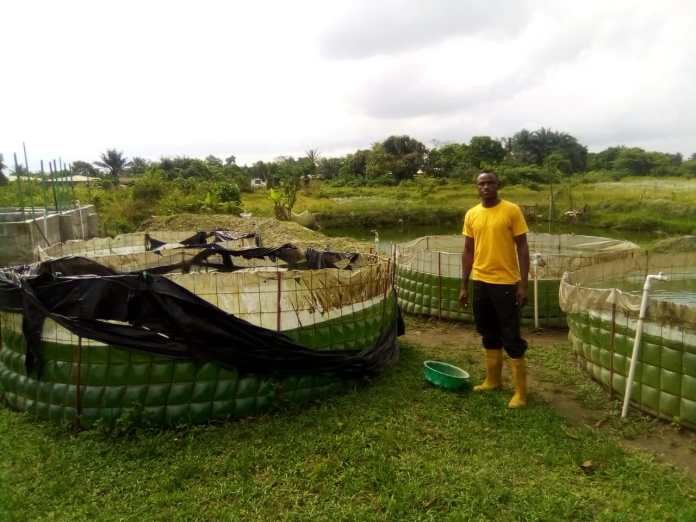J-Palm’s blockchain technology enhances transparency in the oil palm supply chain

Native oil palm “dura palm” is one of the agricultural products that smallholder farmers rely on for livelihood. Farmers harvest fresh palm fruit bunches, which through manual processing procedures extract oil that known as the “red oil”.
The trade in red oil is another activity affecting farmers. Farmers wait on a select market day to sell their harvested or processed products, including the red oil or palm oil.
Kpadehyea Anthony of Koon Town in rural Montserrado County is one of the hundred locals, who rely on dura palm for livelihood. But production and trade in palm oil have not been a rewarding venture for him until an intervention from J-Palm, a Liberian owned enterprise that produces skin-care products including the popular Kernel Fresh Oil.

In 2013, J-Palm established a mini mill with the purpose of sourcing palm-kernel oil from smallholder farmers in the Koon Town. The mill has since had a positive impact on Anthony and other farmers in the area. “The intervention is helping us greatly,” says Anthony. “Before J-Palm came, I was not producing much oil; and selling my oil to marketers who came from the urban markets wasn’t a good business for me because marketers will bring their own price and justified why I should sell my oil at their price. They were not looking at what I went through to make the oil. But what is happening now is that I am producing more and I am getting more money because of this machine.”
CEO of J-Palm, Mahmud Johnson, sees his company’s intervention as a model that can help farmers who survive on dura palm. J-Palm allows rural households to realize a 90% reduction in time needed for oil extraction, a 50% increase in palm oil production, and a 50% increase in income.
“Post-harvest losses result in a reduction in the oil yield. So what we are doing is that we come to these remote areas, and we set up a business chain where farmers use mini-mills to improve their yield. With the mills, they can produce oil at a faster rate. What will normally take somebody 6 hours to do can now be done between 15 to 30 minutes. That is a significant reduction in the processing type, so people can spend more time harvesting the palm fruits that ultimately helps to grow their income,” says Johnson.

Also, J-Palm is responding to the increasing demand from multinational companies for palm oil by putting to use the estimated 220,000 tons of palm kernels discarded annually as waste after extraction of oil from the fruit of wild palm trees.
The Liberian enterprise uses kernel oil to produce a line of skin care products, which is primarily sold on the domestic markets. Apart from skin and hair care products, the company also produces, on a smaller scale, palm oil for domestic consumption and palm kernel cake, something sold to domestic pig farmers as a fiber-rich feedstock. J-Palm is also researching the potential commercial use for palm kernel shells as a cleaner source of biomass charcoal briquettes for cooking and heating.
The company’s innovation and product lines have won it admiration both locally and internationally over the years. Pacha Soap Co. is the latest to express interest in the Liberian company. Recently, a team from Pacha Soap Co. visited Liberia to continue discussions on a partnership with J-Palm which, will result in the Liberian company supplying the American Company with kernel oil. Also, Pacha Soap Co. will facilitate J-Palm’s access to some of the largest natural and health-related product retailers in the United States.

Introduction of blockchain technology
Under an agreement, both companies will use a technology-based operational system to ensure transparency and traceability across the supply chain and track the impact of J-Palm’s supply chain activities on smallholder farmers’ incomes.
Andy Thornton, Director of Sourcing and Impact at Pacha Soap Co. said, “We are thinking carefully about our supply chain; where can we purchase the ingredients that are going into our products in the U. S in the way that creates more values in the supply chain particularly for smallholder farmers.”
Thornton adds that the technology is being used to give a new narrative of the oil palm supply chain, which has suffered a bad reputation over the years.
“So what we are trying to do with our technology is to prove than just tell a story. We are trying to prove that what we are buying is coming from smallholder farmers. So what the technology does is that we are registering every transaction that happens in J-Palm’s supply chain. Every transaction that happens is time-date and location stamp. We will see transaction data from all places that work. This is to ensure that our impact is directly going to the smallholders,” says Thornton.
Johnson takes on blockchain technology
Mahmud Johnson says that technology will help his team in handling real-time issues in J-Palm’s supply chain.
“One thing we care about is to track what impact is it we are creating. Something like this helps us to track over time to see exactly who it is that we are dealing with because one challenge that occurs when you are scaling something like this, is that you cannot be everywhere at every time. So using blockchain technology will allow us to have a clearer view of transactions from across the country,” he says.
What is Blockchain?
Blockchain is an electronic system that allows for record-keeping of transactions in real time. When participants in a blockchain system complete a transaction, the time, date, nature, and cost of the exchange are recorded. Once the parties have confirmed the accuracy of the information, it is then permanently and indelibly recorded and can be made accessible to every other participant in the system.
Challenges of oil palm supply chain
For the past decades, the origin of products, quality, pricing, and payment of palm oil and kernel oil have resulted in unyielding transactions between smallholder farmers and companies in Liberia. Multinational companies growing a selected variety of palm trees for oil extraction have reduced the demand for palm oil from native palm trees. A situation that has resulted in farmers transacting with middlemen whom some farmers have reported for bad pricing practices.
But J-Palm hopes to model a new way of transactions through the aid of the blockchain system in the oil palm supply chain.
“This will ensure transparency in our supply chain and ultimately expands market access for thousands of smallholder oil palm farmers in Liberia. This means potentially higher incomes for rural farmers, and presents a real opportunity to brand Liberian palm kernel oil on a similar scale as, say, Moroccan Argan Oil or Jamaican Black Castor Oil,” says Johnson.






Hi George!
Really interesting article, even I am working on a similar project for my Uni — Blockchain with Argan Oil.
Would love to have your input